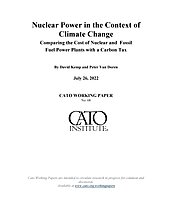Concerns about climate change have led many to advocate for future reliance on nuclear power, a constant low-carbon energy source. But nuclear’s high capital costs have historically precluded its ability to be cost-competitive with fossil fuel generators. Would nuclear power be cost-competitive if the climate-change damages of carbon emitters are included in the cost of electricity? A new nuclear power plant built at construction costs recently experienced in the United States and Western Europe could be cost-competitive with coal if there is a reasonably sized carbon tax, but to have costs equal to a new natural gas combined-cycle plant would require a minimum carbon tax of $265 per metric ton of CO2 averaged over the lifetime of the natural gas plant (approximately $196 per metric ton in 2020). At construction costs 55 percent lower than the average costs of recent Western nuclear projects, nuclear could be a viable option for private investors compared to a natural gas combined-cycle plant, but only if there is a moderately sized carbon tax (a minimum of $70 per metric ton averaged over the next 30 years; roughly $51 per metric ton in 2020) and the projected natural gas price is high.
Nuclear Power in the Context of Climate Change
Comparing the Cost of Nuclear and Fossil Fuel Power Plants with a Carbon Tax
Nuclear power offers a low-carbon option for electricity generation. But it is high-cost relative to fossil-fuel generation, particularly combined-cycle natural gas power plants.


